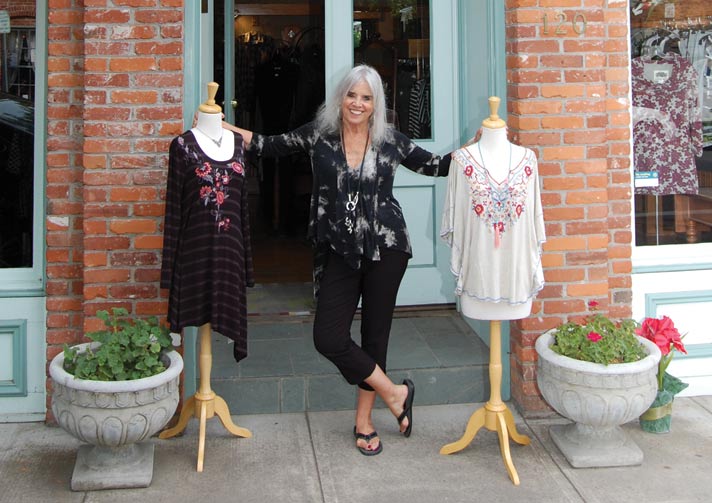120 SOUTH THIRD STREET
Tobiano Boutique, at 120 South Third Street, exudes an artsy vibe. It’s clearly a women’s apparel shop, filled with colorful, flowing garments. With the abstract patterns on many of the fabrics, and the prints of Picasso, Matisse, and O’Keefe gracing the walls, the shop also brings to mind a gallery, or an artist’s loft in Paris.
The mention of Paris makes owner Donis Rothstein smile. She opened the boutique in 1992, and early on, she says, “I did some shopping in Paris. It was fun, and customers liked knowing that I got things from there. But I usually shopped at the prêt-à-porter—the “ready-to-wear” markets. These days, clothing is more casual than when I started, with tops, tunics, dusters, pants, and leggings. So I’ve learned it’s easier to find things at trade shows in Los Angeles, New York, and Las Vegas. I like to give it a bit of a twist. I call it, ‘Casual elegance.’”
Some of the items in Tobiano are neatly folded, or hung in traditional spaces along the walls. But it’s the garments that face the entrance—draped on hooks, mannequins, and a gracefully curved freestanding rack—that draw the most attention. “I try to display as much as I can,” Donis says. “It’s hard to tell what something looks like, hanging on an ordinary rack. So I pull out pieces and place them where they can easily be seen. And I rotate them all the time.”
The shop carries an intentionally sparse but distinctive selection of accessories. “My background is in art,” Donis says, “so I have a lot of faith in my eye. I carry lines available only to boutiques.” French leather necklaces adorned with intriguing metallic pendants, and a collection of Sergio silver ball chain-mesh bracelets, invariably pull customers to their display tables. Delicately jeweled earrings, hand-dyed scarves, and stylish reading glasses give the impression that less is more.
When Donis first moved to Southern Oregon with her partner, they decided to open a shop, but they weren’t certain what kind. “We thought we’d carry a hodgepodge of wonderful things with good taste and good design. But among the other geegaws, I brought in some clothing—and the clothes sold very quickly.”
It didn’t take long for them to narrow their focus. By this time, however, they’d already named the store: Tobiano. “A tobiano is a horse,” Donis explains, “a pinto with a certain pattern of spotting. We’d come from San Francisco, and figured this was horse country, so we thought that it might be a good word to draw in local riders.
“But nobody recognized it!” Donis laughs. “They just thought we were Mr. and Mrs. Tobiano!”

 Paula and Terry identify as writers, with an ever-increasing number of published works to support the supposition. They live a primarily pastoral life in the enchanted town of Jacksonville.
Paula and Terry identify as writers, with an ever-increasing number of published works to support the supposition. They live a primarily pastoral life in the enchanted town of Jacksonville.